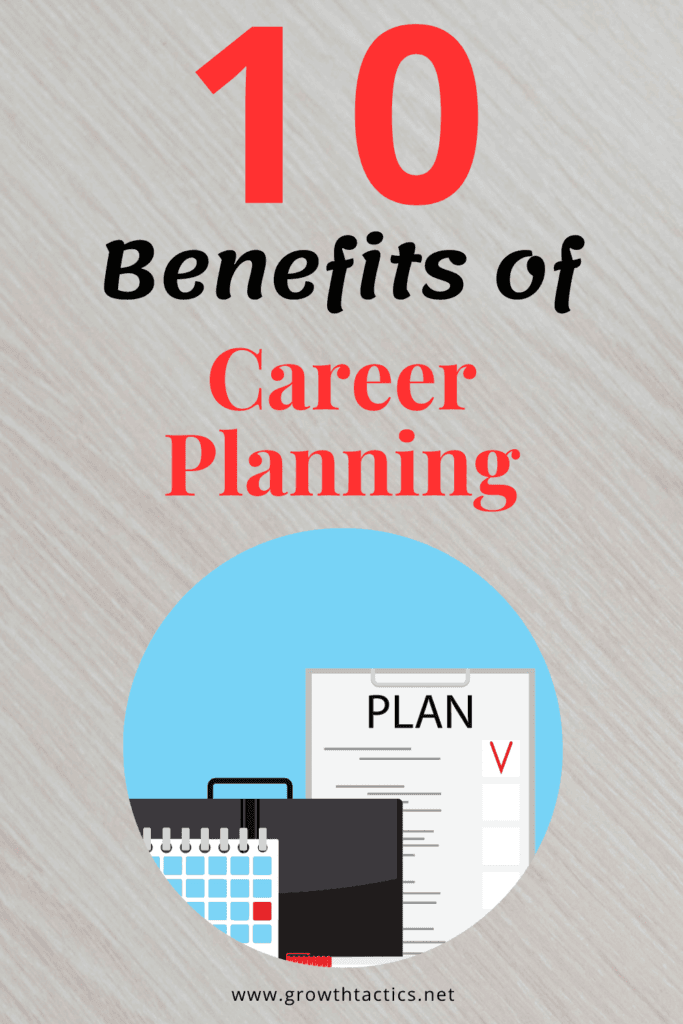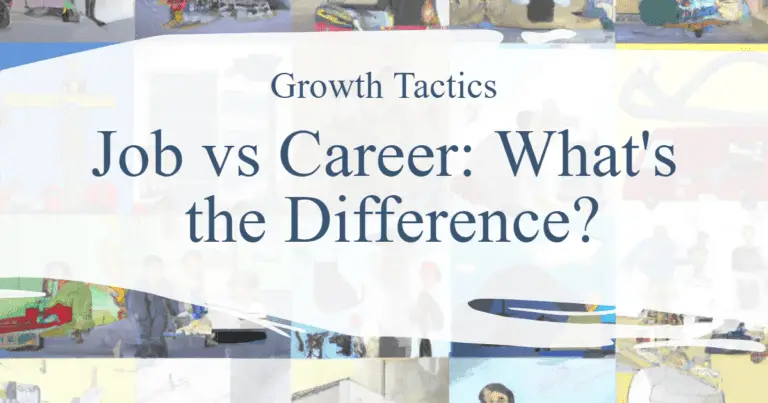Are you drifting through your career, unsure of where you’re heading? It’s time to grab the wheel and steer your professional life in the right direction. Career planning is your GPS for success, guiding you toward your dream job and a fulfilling work life.
In this article, we’ll explore ten game-changing benefits of career planning and show you how to kickstart your journey. Whether you’re a fresh graduate or a seasoned pro, these insights will help you map out a path to a brighter future.
Ready to take control of your career? Let’s jump right in!
Jump To Section
Benefits of Career Planning
Let’s face it, planning your career might sound like a chore, but trust me, it’s worth every minute. Here’s why you should jump on the career planning bandwagon:
It’s your personal roadmap
Think of career planning as your GPS for success. It helps you figure out where you want to go and how to get there. No more feeling lost in your professional life!
You’ll crush your goals
When you plan your career, you set clear, achievable goals. It’s like having a to-do list for your dreams. You’ll be amazed at how much more you accomplish when you know what you’re aiming for.
Hello, dream job
Want to land that perfect gig? Career planning ups your chances big time. You’ll know exactly what skills and experience you need, so you can work on becoming the ideal candidate.
Opens your eyes to new possibilities
Sometimes, we get stuck in a rut. Career planning helps you explore options you might never have considered. Who knows? Your perfect job might be something you haven’t even heard of yet!
Makes decisions a breeze
When you have a plan, choosing between job offers or deciding whether to go back to school becomes so much easier. You’ll have a clear idea of what fits into your bigger picture.
Boosts your confidence
There’s nothing like having a plan to make you feel like a boss. You’ll walk into interviews and meetings with your head held high, knowing exactly where you’re headed.
Keeps you learning
A good career plan includes ongoing learning. You’ll stay sharp, pick up new skills, and keep growing. In today’s fast-paced world, that’s super important.
Helps balance work and life
By planning your career, you can factor in your personal goals too. Want to travel the world or start a family? Your career plan can help you make room for it all.
Makes work more fun
When you’re working towards something meaningful, even mundane tasks become more enjoyable. You’ll find more satisfaction in your day-to-day work.
Sets you up for long-term success
Career planning isn’t just about your next job – it’s about building a fulfilling, successful career that lasts a lifetime. You’re playing the long game here, and it’ll pay off big time.
How to Get Started with Career Planning
Feeling ready to take control of your career? Awesome! Here’s how you can kickstart your career planning journey:
1. Know Yourself
Start by understanding what makes you tick. Grab a notebook and dedicate some time to introspection. Here’s a simple exercise:
- Strengths: List out what you’re good at. Are you a great communicator? Do you have a knack for solving complex problems? Highlight both hard skills (like coding or data analysis) and soft skills (like teamwork or leadership).
- Weaknesses: Be honest with yourself. What areas do you need to improve? Maybe you’re not the best at time management or public speaking. Knowing your weaknesses helps you identify areas for growth.
- Passions: What do you love doing, both in and out of work? Do you light up when working on creative projects, or do you feel most energized solving analytical puzzles?
- Avoidances: What tasks do you dread? Knowing what you dislike is just as important as knowing what you love. It helps you steer clear of roles that might make you unhappy.
- Values: What matters most to you in a job? Is it work-life balance, job security, making a difference, or high earning potential? Understanding your core values will guide your career choices.
2. Set Clear Goals
Think about where you want to be in the next 5 or 10 years. Break it down into specific, realistic goals to make the path clearer and more achievable:
- Job Role: What job title are you aiming for? Maybe you see yourself as a Marketing Director, a Software Engineer, or a Project Manager.
- Company: Is there a specific company or type of company you want to work for? Perhaps you dream of joining a tech giant like Google or a socially responsible nonprofit.
- Milestones: Outline key milestones you need to hit along the way. For instance, if you want to be a Project Manager, you might need to gain certain certifications or manage small projects first.
Setting clear goals turns your abstract dreams into concrete steps, making it easier to plan your actions.
3. Research Careers
With your goals in mind, it’s time to gather information. This research phase is crucial for understanding the landscape of your chosen field:
- Online Resources: Websites like LinkedIn, Glassdoor, and professional association sites can provide job descriptions, salary ranges, and industry trends.
- Career Fairs: Attend local or virtual career fairs. They offer a great way to meet industry representatives and learn about various companies and roles.
- Networking: Talk to people already working in your desired field. They can offer valuable insights that you won’t find online.
- Qualifications: What education, training, or certifications do you need? Research what qualifications are required and which ones are preferred.
- Job Market: Look at job postings and demand in your field. Understanding the job market helps you know the opportunities and challenges you might face.
4. Create an Action Plan
Now that you have your goals and some solid research, it’s time to map out your plan. Break it down into actionable steps:
- Education: Do you need to go back to school or take specific courses? Map out what you’ll need to learn and where to find it.
- Experience: Identify opportunities to gain relevant experience. This could be through internships, volunteer work, or side projects.
- Skills Development: What skills do you need to develop or improve? Look for workshops, online tutorials, or professional training programs.
- Short-Term Goals: Outline immediate actions you can take, like updating your resume, building an online portfolio, or applying for entry-level positions.
- Long-Term Goals: Identify broader steps such as obtaining advanced certifications, expanding your network, or aiming for a management position.
5. Network Like a Pro
Building connections can open doors you never knew existed. Effective networking involves more than just collecting business cards:
- Industry Events: Attend seminars, conferences, and meetups related to your field. These events are great for meeting like-minded professionals.
- Professional Groups: Join associations or groups related to your industry. Being part of a community can provide support, advice, and opportunities.
- LinkedIn: Create a strong LinkedIn profile. Connect with professionals in your field, join industry groups, participate in discussions, and share relevant content.
- Informational Interviews: Don’t be afraid to reach out to people whose careers you admire. Ask for informational interviews to learn about their job, how they got there, and any advice they might have.
- Mentorship: Seek out mentors who can offer guidance and support. A good mentor can provide career advice, help you navigate challenges, and introduce you to key contacts.
6. Upgrade Your Skills
Stay competitive by continually improving your skills. Here are some actionable steps to keep your skill set up to date:
- Online Courses: Platforms like Coursera, Udemy, and LinkedIn Learning offer a wide range of courses. Whether you need to brush up on technical skills or learn new software, these resources are invaluable.
- Certifications: Pursue certifications relevant to your field. Certifications not only validate your skills but also make you more attractive to employers. For example, Project Management Professional (PMP) or Certified Information Systems Security Professional (CISSP).
- Workshops and Seminars: Attend workshops and seminars, both online and in-person. They offer hands-on experience and often provide valuable networking opportunities.
- Bootcamps: Consider intensive bootcamps if you need to gain a new skill quickly. Coding bootcamps, for example, can turn you into a proficient coder in just a few months.
- Volunteer Work: Volunteering can offer practical experience that you might not get in your current job. Look for opportunities that let you utilize or develop your skills.
- Read Industry Literature: Stay informed by reading books, journals, and articles relevant to your field. This keeps you up-to-date with industry trends and advancements.
7. Stay Flexible
Life doesn’t always go as planned, and that’s okay. Being flexible means being open to new opportunities and willing to adjust your plan as needed:
- Embrace Change: Understand that the job market and industry demands can change. Being open to these changes can lead you to unexpected opportunities.
- Alternative Paths: Sometimes your dream job might not be immediately accessible. Being open to alternative paths can provide the experience you need for your ultimate goal.
- Lifelong Learning: Stay curious and be prepared to learn new things. This mindset will help you adapt more easily to changes in your career landscape.
- Temporary Roles: Don’t shy away from temporary or contract roles. They can provide valuable experience and sometimes lead to permanent positions.
- Sidesteps: Sometimes, a lateral move can offer new experiences and skills that position you better for future promotions.
8. Seek Advice and Feedback
Don’t go it alone. Leveraging the knowledge and experiences of others can provide you with invaluable insights and feedback:
- Mentors: Find mentors who are experienced in your field. They can provide guidance, feedback, and support throughout your career journey.
- Career Counselors: Professional career counselors can offer personalized advice and help you develop a strategic career plan.
- Peer Feedback: Don’t underestimate the value of feedback from peers. They can provide a different perspective and offer constructive criticism.
- Family and Friends: Sometimes those close to you can offer insights about your strengths and areas for improvement that you might not have considered.
- Performance Reviews: Use your performance reviews to gather feedback from your supervisors and colleagues. This information can be critical for your professional growth.
9. Review and Adjust Regularly
Your career plan isn’t set in stone. Regularly reviewing and adjusting it ensures that you stay on course and adapt to any changes:
- Quarterly Reviews: Schedule time every few months to review your career plan. Assess your progress, update your goals, and adjust your steps as needed.
- Setbacks: Reflect on any setbacks you’ve encountered. What went wrong, and what can you learn from it?
- Celebrate Wins: Acknowledge and celebrate your achievements, no matter how small. Recognizing your progress can keep you motivated.
- Feedback Integration: Incorporate feedback and advice you’ve received to refine your plan.
- Market Trends: Stay informed about changes in your industry and job market. Adjust your plan if new opportunities or threats arise.
10. Stay Positive and Persistent
Career planning is a marathon, not a sprint. Staying positive and persistent is crucial even when things get tough:
- Mindset: Maintain a growth mindset. Believe that you can grow, learn, and overcome challenges.
- Resilience: Develop resilience by focusing on solutions rather than problems. Overcoming obstacles is part of the journey.
- Support System: Surround yourself with a supportive network of friends, family, and colleagues who can offer encouragement.
- Stay Motivated: Keep reminding yourself why you chose your career path. Revisit your goals and visualize your future success.
- Consistency: Keep pushing forward, applying for jobs, networking, and upgrading your skills regularly. Persistence will eventually open doors.
So, ready to start planning? Grab that notebook and begin your journey towards a fulfilling and successful career! You’ve got this.








